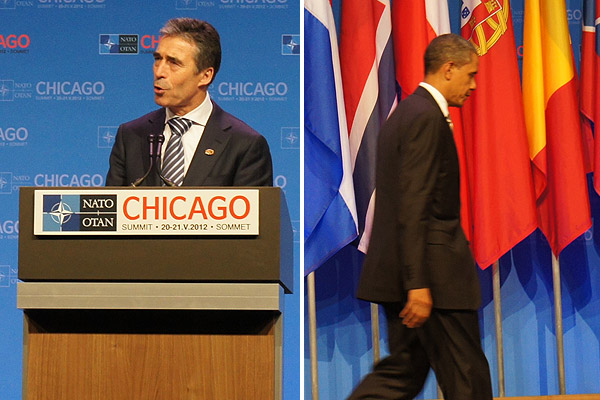
NATO summits are the result of months of diplomatic negotiation, and the beginning of another cycle; Chicago in particular was presented as the culmination of a series of decisions made in Lisbon in 2010. Most prominently, the timetable for withdrawal of combat troops in Afghanistan by 2014 went from agreed-upon in Lisbon to "irreversable" in Chicago, where it was decided that Afghan security forces would finish taking the combat lead across the country by mid-2013, with a surge strength of 352,000 troops to be sustained in 2014 and 2015. In his closing remarks, Barack Obama not only touched on the U.S.'s fiscal need to draw down forces, but its geopolitical need as well:
[F]rankly, the large footprint that we have in Afghanistan over time can be counterproductive. We’ve been there 10 years, and I think no matter how much good we’re doing and how outstanding our troops and our civilians and diplomats are doing on the ground, 10 years in a country that's very different, that's a strain not only on our folks but also on that country, which at a point is going to be very sensitive about its own sovereignty.
What didn't fit into the tides of NATO was Pakistan.
Following the November airstrike that killed 24 Pakistani soldiers, the country closed its supply routes out of Afghanistan after massive public outcry, forcing the U.S. and into more costly routes–about five times more costly–and overshadowing the logistics of the hard-won withdrawal. Pakistan wasn't invited to the summit as a result. As it drew near, however, Pakistan said sure, we'll open the supply routes again, it's just going to cost you 20 times what it used to.
The conclusiveness of the framework and timetable in Afghanistan, one of the centerpieces of the Chicago summit, had to share the spotlight with its uncomfortable neighbor, the inconclusiveness of Pakistan's relationship with the U.S. and NATO. On this, Obama was equivocal:
[M]y discussion with President Zardari was very brief, as we were walking into the summit and I emphasized to him what we have emphasized publicly as well as privately…. [W]e share a common enemy in the extremists that are found not only in Afghanistan, but also within Pakistan and that we need to work through some of the tensions that have inevitably arisen after 10 years of our military presence in that region.
President Zardari shared with me his belief that these issues can get worked through. We didn’t anticipate that the supply line issue was going to be resolved by this summit. We knew that before we arrived in Chicago. But we’re actually making diligent progress on it.
NATO Secretary General Anders Fogh Rasmussen was too:
I would also like to recognise the steps taken by Russia, the Kyrgyz Republic, Uzbekistan and Kazakhstan to facilitate the transit of ISAF cargoes. We count on Pakistan’s commitment to support the efforts of the international community to promote peace and stability in Afghanistan.
And President Asif Ali Zardari, well: "Karzai dismissed the encounter in an interview with CNN as a 'three-way photograph taking… just a photo opportunity.'"
Less equivocal was retired General Jim Jones, who was the national security advisor to Obama through October of 2010. "I know of nothing I did in my tenure as national security advisor was more frustrating than the outcome that we see today of the Pakistan-U.S relationship. I do not understand it because it is not logical."


